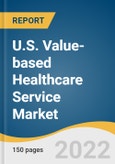The Centers for Medicare & Medicaid Services' objective is to transition all Medicare providers to two-sided risk arrangements and half of its commercial and Medicaid contracts to value-based models by 2025; currently, fewer than 20% of Medicare expenditure is value-based. The increase of consumerism in health care, the development of new technology, the need to fulfilling the Quadruple Aim, and prioritizing preventative care while decreasing unsustainable healthcare expenditures are the primary drivers of the shift to value-based care.
Healthcare reforms in recent years have highlighted the need for electronic health information, which has raised interest in digital solutions. Furthermore, the COVID-19 pandemic has accelerated business expansion by highlighting the benefits of using electronic health information to help improve patient care and scheduling. Several countries are implementing value-based care systems. This increases the demand for high-acuity IT solutions that boost clinical efficacy and workflow, thus supporting market growth.
The rapid evolution of value-based healthcare services is one of the factors driving this market's rapid growth. Due to value-based healthcare services, the healthcare cost curve and excessive health spending have decreased. According to "UnitedHealth Group," a US-based health insurance firm that delivers value-based payments to healthcare providers, this industry's development increased by more than 15% in 2019. It supports the delivery of high-quality treatment while improving the efficient use of healthcare resources.
Furthermore, "Cigna" acquired Bright Health in December 2021, bringing additional skills and resources to continue their development toward a value-based healthcare setting. Collaborations in value-based care are becoming increasingly popular among providers because they enable partners such as medical device makers, payers, and provider groups to build programs, solutions, and initiatives that benefit both patients and healthcare systems. For instance, in June 2021, “Humana’’ acquired League, a digital health company, to create a new digital platform for Humana employer group and specialty insurance members.
To take advantage of the various types of services and technology capabilities required for future success, forward-thinking payers are broadening their options and moving beyond traditional providers. These firms have employed several techniques to improve their position in the value-based healthcare services industry in the U.S., including partnerships, collaborations, joint ventures, and mergers and acquisitions. For instance, in February 2021, Optum, a healthcare provider, completed the acquisition of Leadmark Health, a home healthcare company. It will create the first of its home-based care health system and would accelerate home health care’s move toward value-based care.
U.S. Value-based Healthcare Service Market Report Highlights
- On the basis of models, the patient-centred medical homes segment held the largest revenue share of 31.69% in 2024 and is expected to grow at a fastest CAGR over the forecast period
- The shared savings segment is expected to grow at the lucrative rate over the forecast period due to growing government initiatives aimed at introducing new models and programs
- On the basis of payer category, the medicare and medicare advantage segment held the largest revenue share of 48.48% in 2024 and is anticipated to grow at a fastest CAGR over the forecast period.
- On the basis of service, the self-care segment held the largest revenue share of 37.26% in 2024. Its dominance is due to increasing emphasis on patient-centered care, encouraging individuals to manage their health actively
Why should you buy this report?
- Comprehensive Market Analysis: Gain detailed insights into the global market across major regions and segments.
- Competitive Landscape: Explore the market presence of key players worldwide.
- Future Trends: Discover the pivotal trends and drivers shaping the future of the global market.
- Actionable Recommendations: Utilize insights to uncover new revenue streams and guide strategic business decisions.
This report addresses:
- Market intelligence to enable effective decision-making
- Market estimates and forecasts from 2018 to 2030
- Growth opportunities and trend analyses
- Segment and regional revenue forecasts for market assessment
- Competition strategy and market share analysis
- Product innovation listing for you to stay ahead of the curve
- COVID-19's impact and how to sustain in these fast-evolving markets
This product will be delivered within 2 business days.
Table of Contents
Companies Mentioned
- Baker Tilly US, LLP
- Deloitte
- Siemens Medical Solutions USA, Inc.
- Boston Consulting Group
- Change Healthcare
- Athena Healthcare
- Veritas Capital Fund Management, L.L.C.
- UnitedHealth Group.
- NXGN Management, LLC.
- McKesson Corporation
- Genpact
- Unlimited Technology Systems, LLC
- ForeSee Medical, Inc.
- Signify Health, Inc. (Sentara Healthcare)
- Curation Health
- Koninklijke Philips N.V.
- Humana
- The Commonwealth Fund.
- Stellar Health
- Privia Health
Table Information
| Report Attribute | Details |
|---|---|
| No. of Pages | 100 |
| Published | November 2024 |
| Forecast Period | 2024 - 2030 |
| Estimated Market Value ( USD | $ 4.01 Trillion |
| Forecasted Market Value ( USD | $ 6.16 Trillion |
| Compound Annual Growth Rate | 7.4% |
| Regions Covered | United States |
| No. of Companies Mentioned | 20 |









